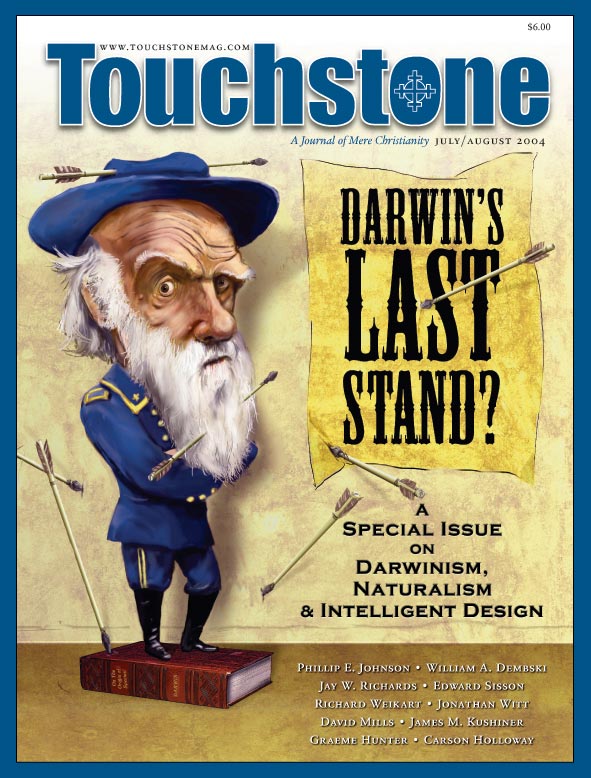Reading the Stars
David Mills on a Father Who Makes a Cosmos for His Children
The things we have declared different we have declared lesser,” declared Christopher Impey, an astronomer at the University of Arizona and “sworn agnostic,” to a reporter from the Tucson Citizen. He had just won a three-year, $275,000 grant from the Templeton Foundation to host a lecture series titled “Astrobiology and the Sacred: Implications of Life Beyond Earth,” and seemed to think that the finding of life on other planets, even microbial life, would upset the religious.
Secular Hope
The article proceeded with his thoughts on the matter, but that is not what interested me about it. At the very end, he says: “It’s extremely unlikely that if we were to discover a civilization or entity that was not from this planet, that they would not be far beyond where we are technologically.” That is the article’s closing quote, the one that is supposed to leave the reader thinking “Wow,” but it left me wondering “Why?”
We have no reason to think that such a civilization would be so vastly superior to us, especially if we were the ones to discover them. It is a statement of blind faith. Impey’s dogmatic confidence on the subject of the superiority of alien races seemed a funny thing coming from someone who was so agnostic about God, for whose existence or non-existence we have so much evidence. And yet so many secular people of scientific bent seem to find in the heavens that which they do not find on earth.
They find God, of a sort. “I consider myself a spiritual person,” the evolutionist philosopher Michael Shermer said in an interview with the Rocky Mountain News. “I have an awe of nature, a sense of transcendence when I see an eclipse or a Hubble space telescope photograph. These things all generate a sense of transcendence, spirituality, every bit as warm and fuzzy and religious as when I was a religious person.” There is, he continues, “a source of transcendence and it’s evolution; these deep-seated moral sentiments were given to us as members of the species by evolution.”
I still do not know why very intelligent men find this kind of thing satisfying. Shermer is claiming that a blind, literally pointless string of complete accidents of which man is a product is “a source of transcendence,” which produces a “spirituality” which is “warm and fuzzy and religious.” Something that has no mind or will can “give” us something we do not have otherwise.
But why should he feel a “sense of transcendence” when he sees an eclipse? All that is happening is that an accidental moon of an accidental planet accidentally orbiting round an accidental sun, accidentally passes in front of the sun and blocks out its light for a few minutes. How is his emotional response justified by an accident? What does he think has been transcended? I am sure he does not feel warm and fuzzy and religious when he sees two cars collide on the highway, but he should, since accidents give him a sense of transcendence.
The word “transcendence” must mean an authoritative word from outside, something greater than man that tells him something he does not know or shows him something he does not see. I am afraid I do not see how the process of evolution can be said to transcend us who are one of its products, any more than the factory assembly line can be said to transcend the car made on it.
Secularism’s Hope
But people who do not believe in God still look to the heavens to give what religion once provided. I wonder if Impey’s faith in the existence of superior aliens expresses one of the materialist’s eschatological hopes: that though Jesus will not descend from the skies, some other savior might. (I use “materialist” to mean someone who believes that the material world is all that exists.)
David Mills has been editor of Touchstone and executive editor of First Things. He edits the opinion page of the Pittsburgh Post-Gazette.
subscription options
Order
Print/Online Subscription

Get six issues (one year) of Touchstone PLUS full online access including pdf downloads for only $39.95. That's only $3.34 per month!
Order
Online Only
Subscription

Get a one-year full-access subscription to the Touchstone online archives for only $19.95. That's only $1.66 per month!
bulk subscriptions
Order Touchstone subscriptions in bulk and save $10 per sub! Each subscription includes 6 issues of Touchstone plus full online access to touchstonemag.com—including archives, videos, and pdf downloads of recent issues for only $29.95 each! Great for churches or study groups.
Transactions will be processed on a secure server.
more from the online archives

19.10—December 2006
Workers of Another World United
A Personal Commemoration of Poland’s Solidarity 25 Years Later by John Harmon McElroy
calling all readers
Please Donate
"There are magazines worth reading but few worth saving . . . Touchstone is just such a magazine."
—Alice von Hildebrand
"Here we do not concede one square millimeter of territory to falsehood, folly, contemporary sentimentality, or fashion. We speak the truth, and let God be our judge. . . . Touchstone is the one committedly Christian conservative journal."
—Anthony Esolen, Touchstone senior editor









